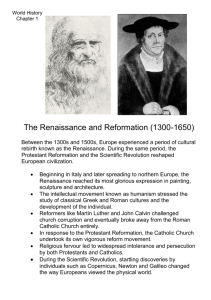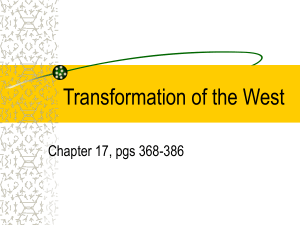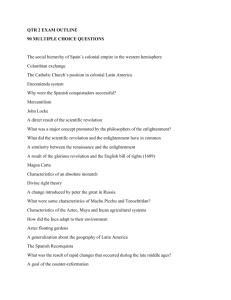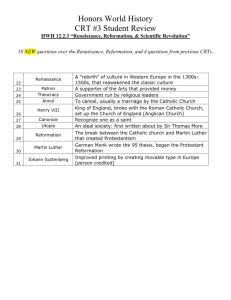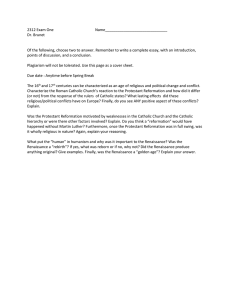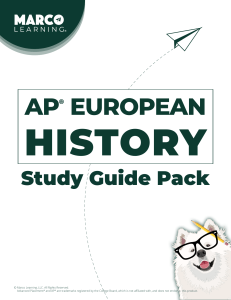Chapter 17
advertisement
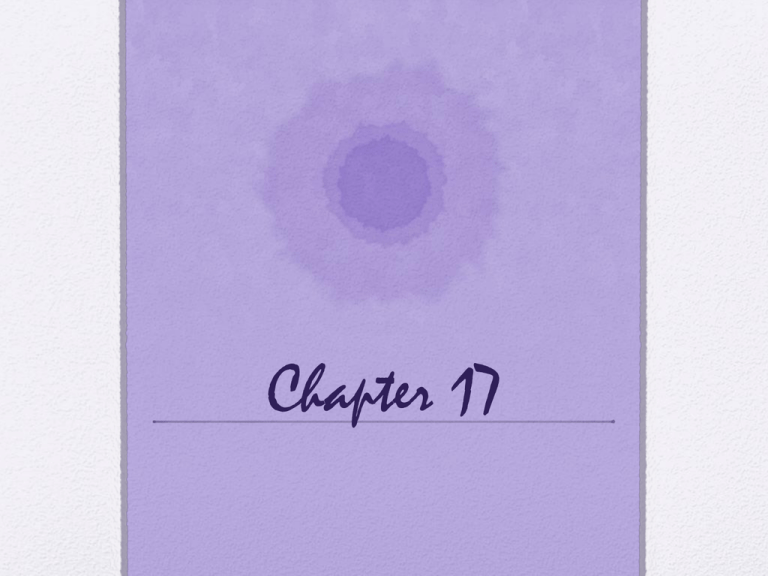
Chapter 17 Today • Reading Quiz • Activity What do you know • Lecture • Simulation • Exit Changes • New developing foundation in the west • Rebuilding out of darkness and death • A new way of life • Including agriculture AND a strong manufacturing and commercial sector • Out of all of this comes new ideas • Culture, Religion, Economics, Science, & Politics st 1 set of Cultural Changes • AKA Renaissance • Challenge to medieval intellectual values and styles • Rethink old truths in everything • Not an attack on religion but rather a de emphasis on religion • Secularism • Northern Renaissance • Classical art and architecture • Blending the lines of secular and religious Renaissance • New emphasis on realism and humancentered themes • Humanism • Real human figures (not idealized) • Real discussion of power • Other changes: • Printing press • European-style family: nuclear family • Urbanization Renaissance • With cultural changes came some political changes • More state power • The lords still had great power at the time but things are changing • Patron-Client relationship • Rich people sponsor and pay for the art being created People of the Renaissance • Erasmus • Da Vinci • Joan of Arc • Machiavelli Religious Changes • AKA Reformation • End of Christian Unity • Martin Luther • 95 thesis • Grievances against the Catholic Church • Selling of indulgences • Believed only faith could gain salvation • Challenged many beliefs including the authority of the Pope Reformation • Starts to look Nationalistic • Especially in Germany where they question paying taxes to the Pope • Protestantism: religious dissent • Lutheran • Anglican (Church of England) • Calvinism • Predestination People of the Reformation • John Wycliffe • Jan Huss • Catharine of Sienna • Martin Luther • Girolama Savonarola • Henry VIII • Jean Calvin Catholic Reformation • In response to the Protestant Reformation • Revival of Catholic doctrine to counter this surge in new beliefs • Validity of papal authority • New Catholic order: Jesuits • (Pope Francis is the first Jesuit Pope) • We will see them again as we talk more about missionary work People of the Catholic Reformation • Pope Paul III • Council of Trent • Jesuits & Ignatius Loyola Both Reformations • Results of these changes in religion • Battles of Religion • France: Catholic vs Calvinism • Edict of Nantes which granted some tolerance to Protestants • Germany: Protestants vs. Holy Roman Empire • 30 years war • Ended with the Treaty of Westphelia • Britain: Protestants vs. Catholics • Elizabeth vs. Mary • English Civil War Both Reformations • Impact • People less likely to see an intimate connection between God and Nature • People didn’t believe in Miracles as much • People started emphasizing the nuclear family and the love between husband and wife Political Changes • Sort of AKA Absolutism • End of feudal monarchy: balance between Kings and Nobles • Monarchs gain new power • France was the model • Slowly the king took back power • Britain is going to be somewhat different • English Civil War (Glorious Revolution) • Parliamentary Monarchy Political Changes • Absolute Monarchy • Best Example: Louis XIV • What made them different: • • • • • Gave money to the arts Set up education Set tariffs (mercantilism) State run manufacturing Strong military Louis XIV France • Became king at the age of 4 ½ • His mother was regent over him • Fell in love but married for political gain to Marie-Therese of Austria who was the daughter of the king of Spain Absolute Monarchs Philip II of Spain Peter the Great of Russia Absolute Monarchs Frederick the Great of Prussia Charles I of England Absolute Monarchs Maria Terasa of Austria-Hungary Political Changes • Nation-State (VERY IMPORTANT) • These Absolute rulers and Parliamentary Monarchy ruled the people of common culture and language • This is very different from previous empires • These commonalities brought about loyalty and cultural/political bonds • Beginning of Nationalism Economic Changes • AKA Commercial Revolution • Develops out of: • A growing manufacturing and trans-Atlantic trade • This means NEW STUFF to buy • New colonial markets stimulated manufacturing • Developing of agricultural specialty areas • Increase in prosperity of ordinary people Commercial Revolution • Money came pouring in: Good and Bad • More money means the supply goes up • This means the value goes down • Inflation • New Wealth = New Demands • Government backed trading companies grow in influence Commercial Revolution • Development of a new group • Proletariat: people without access to wealthproducing property • Rising food prices especially hurt the poor • These major shifts caused popular protests • This will continue to be an issue Scientific Changes • AKA Scientific Revolution • New Scientific institutions created with government aid • Research • Access to the public • People could control and calculate their environment • Doctors • Science became central to intellectual life • Over religion Scientific Revolution People of the Scientific Revolution • Nicolas Copernicus • Kepler • Galileo • Newton • Galen • Tycho Brahe • William Harvey nd 2 set of Cultural Changes • AKA Enlightenment • France is the focal point of the Enlightenment • New development of more Rational Thought • Scientific Method • Modern Social sciences • Philosophy • Political developments Enlightenment • New ideas of the time that we still use today • Inalienable rights • Life, liberty and Property • Separation of Power • Civic Duty • Social Contract • The government works for the people and if the people don’t like it they have the right to change it People of the Enlightenment • John Locke • Jean-Jacques Rousseau • Baron de Montesquieu • Francois Marie Arouet “Voltaire” • Thomas Hobbes • Adam Smith
